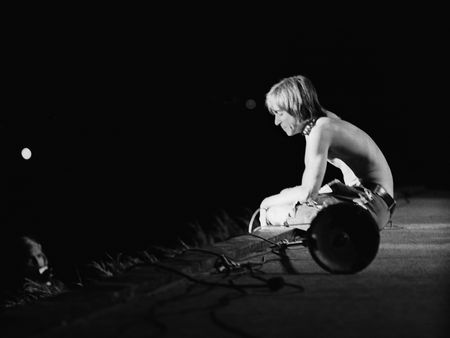CLEVELAND, Ohio — Ben Blackwell feels that the Stooges’ new “Live at Goose Lake: August 8th, 1970” album marks “a nice turning point” in the history of Third Man Records.
The archival set, documenting the final performance by the iconic Ann Arbor rock group’s original lineup, came out Friday, Aug. 7, coinciding with the 50th anniversary of the Goose Lake International Music Festival in Michigan’s Leoni Township, near Jackson. But rather than the digging and sonic spelunking that Blackwell and others at Third Man have done to acquire other vintage recordings and even entire record label catalogs, the Stooges tape landed in the company’s lap after being discovered in a box in Wyoming, Mich.
“This was the first time of, ‘Oh … our reputation did the work here.’ Someone found something and they brought it to us. That makes you feel really good,” the Detroit-born Blackwell, who co-owns Third Man with his uncle, Jack White, and Ben Swank, says by phone from Nashville, Tenn., where the company is based.
“It’s another notch in our reputation.”
The late sound engineer James Cassily recorded the Stooges’ seven-song set — its entire “Fun House” album — among other performances by Chicago, James Gang, Mountain and more, at Goose Lake. The box of tapes wound up at the Rogers Mansion in Wyoming, which belonged to his family. It was discovered by Joshua Rogers as items were being cleared out of the house.
“Through kind of friends of friends (Rogers) reached out to Third Man,” Blackwell recalls. “The idea was, ‘Hey, you guys do really amazing archival work. You’ve worked with Iggy previously. I don’t even know if there’s music on these tapes. You want to find out together?'” Third Man had worked with Stooges frontman Iggy Pop on his book, “Total Chaos: The Story of the Stooges,” and vinyl editions of the Stooges’ 1969 debut album.
Blackwell, a Stooges devotee, did not hesitate to say yes.
“If I were given the Godlike power to pick any show from the Stooges’ entire career, Goose Lake would’ve been the one I’d want to hear, because it’s so shrouded in mystery and talked about for decades,” he says.
One legend surrounding the gig was that bassist Dave Alexander, presumably affected by substances he’d ingested, did not play and/or played poorly — which led to him being fired afterwards, plunging the Stooges into a dark period of hiatus broken by 1973’s “Raw Power” album. Pop acknowledges by email that “Dave took something that night that totally blew him down before the show” and that the bassist’s performance was a mixed bag. “Sometimes he was there, sometimes he wasn’t. My overwhelming memory for years has been of standing there with no backup. When he missed his cues, I turned around several times to look and try to catch his attention and, in those moments, he wasn’t playing anything, and he wasn’t reachable.”

Stooges frontman Iggy Pop onstage at Goose Lake International Music Festival in Michigan’s Leoni Township on Aug. 8, 1970. “Live at Goose Lake: August 8th, 1970” is an archival set, documenting the final performance by the iconic rock group’s original lineup is out now on Third Man Records. (Photo: Charlie Auringer/Courtesy Third Man Records)
Of the decision to fire Alexander, Pop adds that, “There had been issues between myself and Dave before this night, and I’d had enough and I said so. I would do exactly the same thing now.”
Blackwell, meanwhile, feels that the “Live at Goose Lake” release finally sets the record straight.
“Dave’s there,” Blackwell notes. “Dave’s on every song. He starts off particularly rough on ‘Loose’ (the set’s first song), but from there I feel like he holds his own. I don’t feel like there’s anything really egregious from that point on — and not that bad compared to how bad a Stooges set could go.
“As a Stooges fan, in my mind, this changes everything. This Rock and Roll Hall of Fame band’s narrative has been dramatically changed from just one tape.”
The Goose Lake tape, Blackwell adds, was in “solid” shape, especially compared to others in Cassily’s box, which he says were considerably weaker. Nashville engineer Vance Powell worked some sonic magic on the source material, which was finished off at Third Man Mastering in Detroit, where the vinyl LPs were pressed. “What we started with was by no means bad,” Blackwell says, “but from what we started with to what we ended up with, it’s pretty remarkable. I almost feel like I need to do a before and after test to show people how good it sounds.”
Blackwell is also pleased that “Live at Goose Lake” presents the Stooges’ entire set, including festival organizers’ attempt to rush the band off the stage partway through, but, according to Pop, “were physically prevented from doing so by our crew, who were all Vietnam combat vets.”
And Pop, like Blackwell, is happy to have the show finally available for fans to hear.
“It’s great that this recording is coming out now, because it is concrete, clear and indisputable,” he says. “There is and has been so much baggage around the group, and that’s all it is — baggage. … It’s really good to have this live document of something that feels like only the Stooges can feel.”
For Third Man’s part, Blackwell hopes there will be more basement and attic discoveries that make their way into his company’s hands.
“The hope is other interesting things will come out,” he says. “I find it mind-boggling there’s no live recordings of any earlier Stooges stuff. Somebody said, ‘Do you think there’s more out there?’ There’s gotta be. I’ve heard rumors about things that are floating around. Whether someone knows it’s important or not is another matter, but if people find things, I hope they bring it to us.”